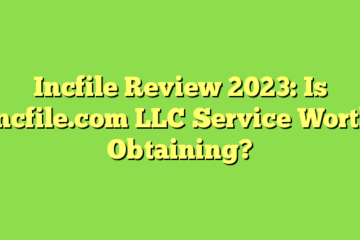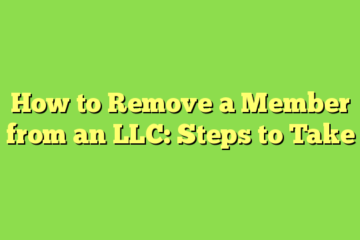When you think of nonprofits and charities, the traditional corporate structure likely comes to mind. But what if you could pursue your philanthropic goals through an unconventional business entity?
An intriguing possibility is using a limited liability company (LLC) to establish a nonprofit venture. While not the norm, it is indeed legally possible in some states to form a nonprofit LLC – but it comes with major caveats and stringent requirements.
Let’s take a closer look at the nonprofit LLC structure to determine if it’s a viable option for your charitable aspirations or more of a regulatory headache. We’ll explore the conditions, potential advantages, drawbacks, and alternative paths so you can make an informed decision about structuring your non-profit enterprise.
What Exactly is a Nonprofit LLC?
A nonprofit LLC is a limited liability company that has been officially organized for a charitable, educational, religious, literary, or scientific purpose rather than to make a profit. By definition, no part of the nonprofit LLC’s income is distributed to its members, managers, or officers.
While most nonprofits take the form of corporations, some states like Minnesota, Kentucky, Tennessee, and North Dakota have specific provisions allowing LLCs to be formed for nonprofit purposes as well. In states without such legislation, nonprofit LLCs may simply go by the name “nonprofit liability company.”
Stringent IRS Requirements for Tax Exemption
For a nonprofit LLC to receive the coveted 501(c)(3) tax-exempt status from the IRS and be treated the same as a nonprofit corporation, it must meet over a dozen strict conditions and requirements outlined in an IRS mandate called “Limited Liability Companies as Exempt Organizations – Update.”
Organizational Documents Restrictions
Perhaps the biggest hurdle is the restrictive language that must be included in the LLC’s articles of organization and operating agreement. These formation documents must:
- Clearly state the LLC will operate exclusively for exempt, nonprofit purposes
- Stipulate that all members must be 501(c)(3) nonprofits or governmental entities
- Prohibit transfer of any membership interest to non-501(c)(3) organizations
- Require assets be used for charitable purposes if the LLC dissolves
- Prevent merging with, converting into, or becoming a for-profit entity
- Include a contingency plan if a member loses 501(c)(3) status
- Be fully consistent with the state’s LLC laws
Additional Requirements
Beyond the detailed organizational documents, the IRS conditions also mandate that:
- The nonprofit LLC cannot distribute assets to members that cease to be 501(c)(3) nonprofits
- The exempt members must enforce their rights to protect the LLC’s interests
- Any amendments must still comply with 501(c)(3) rules
Membership Composition
One of the most prohibitive requirements is that every single member of the nonprofit LLC must itself be a 501(c)(3) tax-exempt organization or governmental unit. This prevents individuals from having membership interests.
Potential Advantages of the Nonprofit LLC
While the IRS requirements are extremely stringent, forming a nonprofit LLC can provide some benefits compared to a nonprofit corporation, including:
- Limited liability protection for all members
- Pass-through taxation for multi-member LLCs
- More flexibility in management and operating processes
Drawbacks to Consider
The main drawback is simply the difficulty and complexity involved in meeting all of the IRS conditions to be approved as a legitimate nonprofit LLC. This makes the formation process more complex than a traditional nonprofit corporation.
Other potential disadvantages include:
- Nonprofits are often steered toward the corporation model that is more familiar
- Membership is restricted only to other 501(c)(3) nonprofits (no individuals)
- Not all states authorize the formation of nonprofit LLCs
Alternatives to Explore
If the nonprofit LLC seems too complicated or is not permitted in your state, there are some alternatives that may better suit your charitable organization:
Nonprofit Corporation
By far the most common route is to simply form a traditional nonprofit corporation. This structure provides liability protection and tax exemption if requirements are met, without as many overly restrictive conditions.
Low-Profit LLC (L3C)
Some states allow low-profit limited liability companies (L3Cs) that can have socially beneficial purposes while still operating as for-profit entities. They do not receive tax exemptions but can accept program-related investments from foundations.
Final Verdict
While legally possible in some states if very specific IRS requirements are met, the nonprofit LLC is an extremely rare business structure for charitable organizations. The complexity involved in forming one makes it an arduous process that most groups choose to avoid.
Unless there are compelling advantages over the traditional nonprofit corporation model, forming a standard 501(c)(3) is likely the easier and more straightforward path.
Consulting expert legal advice is highly recommended before attempting to establish a nonprofit LLC, as it will remain an uncommon exception to the norm for most organizations with nonprofit aims. Be sure to carefully review state nonprofit laws and IRS regulations before attempting to form a nonprofit LLC.

Alfie Wilson, Esq., is a legal content writer with expertise in business formation, criminal law, veterans disability, family law, DUI law, personal injury, animal welfare, and legal writing. He holds a J.D. from Emory University School of Law and has experience in appellate advocacy and regulatory matters. Alfie’s passion lies in breaking down complex legal topics for a non-lawyer audience. He currently writes for law firms and non-profits on various issues and resides in Arlington, Virginia.









